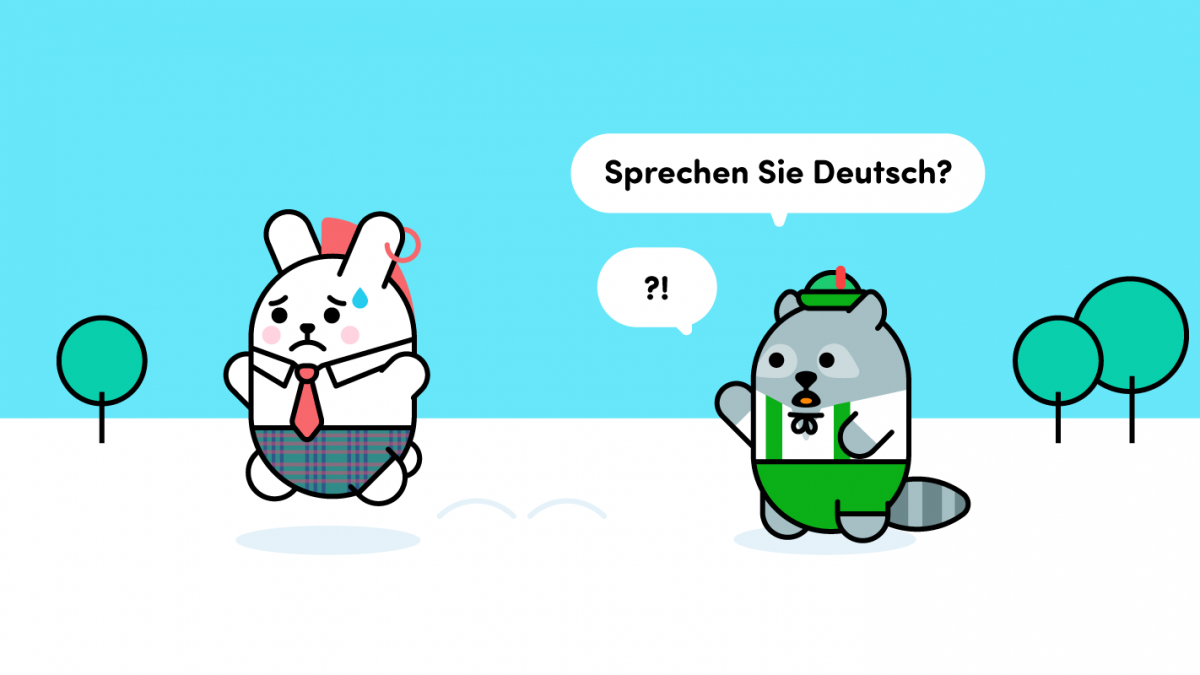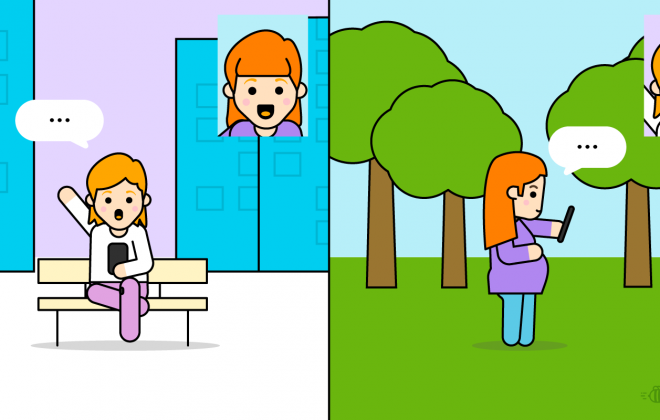Is German really that difficult to learn?
German and English are both members of the West Germanic branch of languages, within the Germanic branch, which is in turn part of the Indo-European family of languages. Even though this means that they are quite close in linguistic terms, German has a bit of a reputation as a hard nut to crack in terms of new languages to learn among English speakers. Mark Twain famously hated “The Awful German Language” and Oscar Wilde is said to have quipped that “life is too short to learn German”. They were obviously frustrated learners and did no good for the reputation of the language! And when confronted with the task of learning a new language, it is sometimes really easy to let yourself be swayed by its reputation.
The truth, however, is that it is really not as difficult as many make it out to be. For English speakers, it is definitely something that can be conquered in the mid-term. We won’t lie to you however: it does have its challenging aspects.
The short answer to the question of whether a language is difficult to learn is that it depends. It depends on the language and on the learner. Let’s dive into a few of the aspects of standard German in terms of vocabulary, grammar and culture, and how each of these contributes to making it an easy, or not so easy, language for English speakers to learn.
Vocabulary – you probably already know more than you think
Languages are made up of their words, their vocabulary. When talking about German, the good news here for English speakers is that because the two languages have a common “ancestor” language, there are many words that are extremely similar. In fact, although English words come from Latin, French and Greek as well, around 80% of the most commonly used English words are cognates of German words and around 40% of all English words are similar to their German equivalents. This is usually because they come from old West Germanic languages, from which modern German dialects also evolved and which served as the base for modern Standard German.
Examples of English-German cognates include the words for the different days of the week, months of the year, some seasons, some relatives and many others. In writing, cognates are sometimes “camouflaged” but with a little bit of practice and when you know what to look for, they are recognisable. For example, it helps to know that most infinitive forms of regular verbs end in -en and that nouns are capitalised. In practice, this means that many English speakers will soon understand a large part of everyday German words, particularly if they see them written down.

Take the following words: Januar, Februar, Montag, Freitag, Hund, Schiff, Brot, Bohne, gehen, Bäcker, Bier, Nacke, Nase, Gott, Onkel, Winter, laden, and Wurm. You probably understood some of them, and if you know how the different combinations of letters are pronounced, you can probably take a shrewd guess at many others (January, February, Monday, Friday, dog (hound), ship, bread, bean, go (to go), baker, beer, neck, nose, God, uncle, winter, load (verb) and worm). This is just a short list pulled off the top of this writer’s head of words that are essentially the same word in both languages!
In more specialised realms, however, such as science for example, meanings are often less obvious. Even so, words are often the same with the only difference that English often uses Latin or Greek terms. For example, the word Sauerstoff appears to be completely alien at first, but it is actually a literal translation of oxygen which has its origins in Greek and could be loosely translated as “acid forming thing”.
In many cases though, even where words are etymologically similar, they can come across as being intimidating. This can be because they are written using many, many consonants, or because of the tendency that German seems to have to take what in English would be short sentences and make them into a single, sometimes apparently ridiculously long, compound word.
Those pesky long German words- compounds.
In linguistics, a compound is a word that is made up of two or more words that are stuck together (or to be more technical for the nerds out there, a lexeme made up of two or more stems). German is notorious for using compound words. Some are quite short and relatively simple such as Flugzeug, made up of Flug (flight) and Zeug (stuff), giving us “flightstuff” or, as we say in English, aeroplane!
Others that are made up of several words are more complicated though, and sometimes a huge mouthful to say. Take, for example, Bundesausbildungsförderungsgesetz, made up of Bundes (Federal), Ausbildung (training or education), Förderung (promotion of) and Gesetz (law). Put them all together and you get the “Federal law for the promotion of education and training” (a government backed half grant half loan for students). Like many things in German though, Germans themselves are more practical about its everyday use and don’t actually say this very often, but rather opt to shorten it to BaFöG.
Another example of this German style linguistic pragmatism is Wohnungsgemeinschaft. This is just made up of two words, Wohnung (apartment) and Gemeinschaft (community or association) and is a rather poetic way of calling a shared flat. Again, Germans usually just refer to this using the initial letters of its comprising words and we are left with a WG (veh-gheh). Staying with the theme of flat hunting, if you ever have to look for a room or particularly an apartment or a house, one of the Bewerbungsunterlagen (Bewerbung, application and Unterlagen, documents; application documents) you will have to hand your potential landlord is the Mietschuldenfreiheitsbescheinigung that is, the Miet(e) (rent), Schulden (debt), Freiheit (freedom), Bescheinigung (certificate); the certificate of rent paid or CRP in English. Now you know!

It’s all relative- and it could be worse!
As we have seen, where you encounter a new word that is long enough to be a sentence, you can take a minute and see if you recognise any of its constituent parts to get an idea of what it means. Even if you have never seen it before, you will often be able to make an educated guess about it! And remember, because of the way that vocabulary is often formed by joining terms together into one, German words often don’t translate into English as single words but rather as short sentences. Takes some getting used to!
Still, although some German words seem to be very long, there are other languages that do this as well but are much, much harder. Take Welsh for example and try saying the name of this village in North Wales: Llanfairpwllgwyngyllgogerychwyrndrobwllllantysiliogogogoch (!). German suddenly doesn’t look quite so intimidating anymore, does it?
It’s said like it’s written
And some more good news: German follows regular patterns in terms of how sounds are written and this makes it quite easy for beginners to have a fairly good go at speaking right away, even if they might stutter when faced with some of the longer words. Compared to other Germanic languages, such as Danish, Dutch and yes, English, this is one of the things that makes German a more approachable language for adult learners.
As for the longer compounds, even Germans might hesitate when faced with one of the beasts, so they are usually not used in the everyday language that most people encounter most of the time.
Unless you are a lawyer, that is. Fancy chatting about the Rindfleischetikettierungsüberwachungsaufgabenübertragungsgesetz, anyone?
The thorn in everyone’s side: Grammar.
A language’s grammar is the system that it uses and the structure that it follows; it’s how languages are built and how they work. If you had to describe a language, grammar would make up the “bulk” that description. It is what determines how the different parts are put together and how the language as a whole works.
Some parts of German grammar are particularly tricky for English speakers to get to grips with, but German grammar is actually arguably easier to learn than English grammar because it follows set rules that are laid down by the three regional authorities, in Germany, Austria and Switzerland (with small differences among them), whereas English is often more chaotic. What makes German grammar hard for English speakers is not really that it is complex, but rather that some parts of it are simply different to what we are used to.
Noun gender and cases
For many people that begin learning German, declension is arguably the hardest bit of the language to master and one of the most important differences between speaking some German and speaking German well. Declension is a very useful trait in a language because it allows for meaning to be conveyed using sentences in which the order of the words is much more flexible. It achieves this by marking the properties of the “actors” within a sentence, such as their gender and number, as well as their relationship with one another, often by merely modifying the endings of words. The starting point of declension in German around which the system is built is the noun.
German nouns are gendered. This means that objects are assigned a grammatical gender: feminine, masculine or neuter. This gender does not necessarily have any relation to what the noun actually means, of course, since it is the word and not the thing that is gendered. For example, the sun and the moon have no gender in English, since they are inanimate things, but in German the sun is a “she” and the moon is a “he”. In Spanish and French however, that is the other way around. When learning new nouns in German, it is a good idea to learn them along with their gender – you are going to need it later!
The good news is that like most things German, there are rules, and there are often certain clues regarding the gender of many nouns. The bad news is that there are quite a few of these!
A non-comprehensive account of these is that male people and animals, instruments or things that do things, days, months and seasons and weather elements as well as rivers that are not German are usually masculine; female people and animals, most German rivers (notable exceptions here are der Rhein and der Main), flowers, trees and groups of people or things tend to be feminine; and finally, most inanimate objects, metals, verb infinitives turned into nouns, diminutives and for some bizarre reason human as well as many animal babies are usually neuter words. There are also certain endings of words that are often clues as to their gender.
Gendering nouns is quite a common thing in many other Western European languages such as French or Spanish. However, something that often causes problems for learners of German, that is not an issue for other Western European, non-germanic languages, is the case system.

German has 4 cases: nominative, accusative, genitive and dative. That is one more than English, where we don’t have the dative case. To add a little bit of confusion, when talking about English we usually name cases differently. In English, the nominative case is often called subjective (she/he), the accusative case is called objective (her/him) and the genitive case is called possessive (hers/his). Another difference with English is that we don’t use the case system as much (at least in modern English) even for the cases that we have. In English, we only change some pronouns following the case system whereas as German also modifies nouns and adjectives and uses cases to describe possession and assign indirect objects (genitive and dative respectively). Again, this follows rules and there are tables and mnemonics that you can use to try to internalise these, but the best way to learn is often by doing. This is one of the more challenging aspects of learning German and takes a little bit of time and practice until it becomes something instinctive. All the same, if you compare it with some other languages, it is a walk in the park. Take Russian for example, with its 6 cases, or if you want something really challenging take a gander at Hungarian and its 18 cases!
Verb position and separable verbs – tricky but rhythmic.
Something else that is distinctive about German grammar is the positioning of its verbs and that they often split. There are also a couple of general rules of thumb here. If a sentence is simple (ie it contains only one clause) and a statement, the verb will usually appear in the second position; if it is simple and a yes/no question, it will go in the first position. In a subordinate clause, however, the verb will always be at the end, and if there is a modal verb involved, this will take the very last spot. Because of this, it might be the case that you find yourself waiting for the verb to know what someone is talking about and that by the time you reach this you have almost forgotten what the rest of the sentence was! On the other hand, it gives German a certain rhythmic quality and makes it quite easy to know how to structure your sentences.
A trickier thing is what Germans call trennbare verben , separable verbs. These are verbs that, in their infinitive form have a prefix attached to them that splits away when they are conjugated. What makes them tricky is that the prefix is then usually dropped somewhere after the verb, usually, again, at the end of a sentence. These kind of verbs are similar to English phrasal verbs, which are also tough for people that learn English as a second language, but a little bit harder because the space between their parts is usually much more, so it is easy to forget to complete them.
Cultural aspects
Every language is inextricably linked to the culture or cultures where it is spoken. When considering how difficult a language is to learn, it is therefore important to think about the cultural side. For those that go to Germany on their holidays, or those that have moved there, there are various things about trying to use German with natives in the German speaking world that you should be aware of. German speakers have a tendency to get to the point that can be perceived by many native English speakers as anything from blunt to downright rude. When trying to learn their language, this can be a positive or a negative thing depending on how you decide to take it. Being cut off and corrected when you got a letter at the end of a word wrong, or merely mumbled it to not make an easy mistake, can be great to avoid developing bad habits but it can also be intimidating. The learner has to make a conscious effort for it to be the former rather than the latter. Mistakes are good, they are a way to learn, possibly the best way to learn, but unless they are caught and addressed they are useless and stay as mistake.
On the other hand, although there are plenty of German native speakers, particularly younger ones and particularly in the more cosmopolitan cities, that speak flawless English, the level of penetration that English has in German speaking society is not as high as in other places such as the Scandinavian countries or the Netherlands for example. Besides a rich literary tradition in German, foreign films and tv shows, including everything produced by Hollywood are all translated and dubbed into German as well, providing a great source of input. All of this combined means that it is easier to fully immerse yourself in the German language and culture in order to learn it quickly if you move to a German speaking country than it is to, say, attempt to learn Danish in Denmark, where it seems that everyone, even the elderly, speak fluent English and where English language TV and films are ubiquitous.
It all boils down to how much you want it

Regardless of how similar or different any language is to your own native language, at the end of the day what makes the difference between your learning a new language or not is your motivation. How well and how quickly you learn German ultimately depends on how hard you work at it much more than how difficult the language actually is. For English speakers, German is not that hard in some ways. Many words are obviously similar and many others are related in a way that you learn to work out in time. Those fearsome compound words are actually not that hard to break down if you’re not afraid of them and you can even make up some of your own! The trickiest aspects of German which are in its grammar, gendered nouns, the case system, verb placement and separable verbs all follow rules that, even if there are a fair number of them, can be learnt. And if you make mistakes and want to be corrected by natives as you learn, all you have to do is ask, and believe you me, they will not shy away from it!
Learning German takes some work, and you will not become fluent from one day to the next. And it is exactly because of this that it is a satisfying experience and it has many benefits besides the obvious ones if you happen to live or simply be in a German speaking country.
This is a marathon, not a sprint. BUT, having said that…Ever heard of the runner’s high?
Want to learn more?
If you’re feeling inspired, sign up below for a free two-week trial and a Live Lesson with a private qualified tutor to start speaking a new language for real! Our classes are structured around exercises created by language teachers, so there’ll be no awkward silences – we promise! 😉
And don’t forget to check out our Facebook, Twitter and Instagram pages for more language content!



